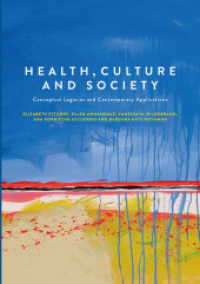- ホーム
- > 洋書
- > ドイツ書
- > Humanities, Arts & Music
- > Linguistics
- > general surveys & lexicons
Full Description
This book provides curriculum planners, materials developers, and language educators with curricular perspectives and classroom activities in order to address the needs of learners of English as a global lingua franca in an increasingly globalized and interdependent world. The authors argue that language educators would benefit from synthesizing and using research and evidence-based cooperative learning methods and structures to address the current world-readiness standards for learning languages in the five domains of Communication, Cultures, Connections, Comparisons, and Communities. The book outlines the main cooperative learning principles of heterogenous grouping, positive interdependence, individual accountability, social/collaborative skills, and group processing, then demonstrates their relevance to language teaching and learning. This book will be of interest to students in pre-service teacher education programmes as well as in-service practitioners, teacher trainersand educational administrators.
Contents
Chapter 1: Introduction.- Chapter 2: Cooperative Learning and World Readiness Standards for Learning Languages.- Chapter 3: The Theoretical Relevance and Efficacy of Cooperative Learning in Second-Foreign Language Teaching and Learning.- Chapter 4: Interpersonal, Presentational, and Interpretive Communication: How can Cooperative Learning Promote It?.- Chapter 5: Culture and Cooperative Learning in Second-Foreign Language Education.- Chapter 6: Cooperative Learning and Connections Across the Curriculum.- Chapter 7: Language and Culture Comparisons: The Role of Cooperative Learning.- Chapter 8: Cooperative Learning and Learning Communities.- Chapter 9: Conclusion.








